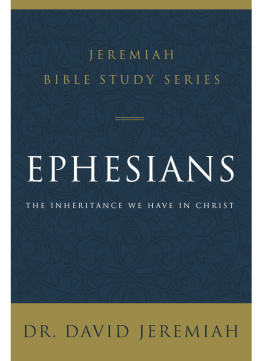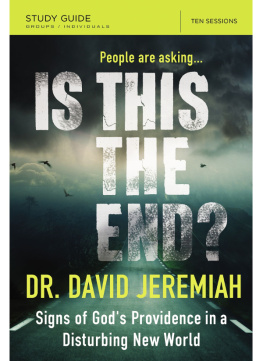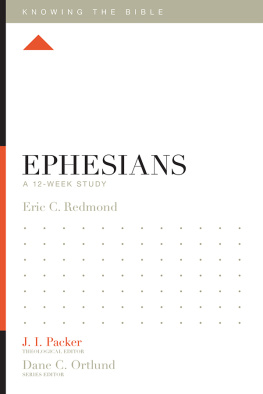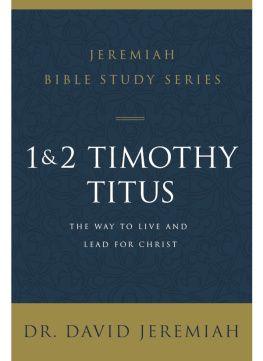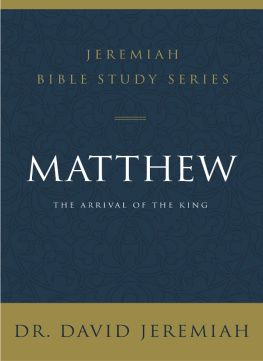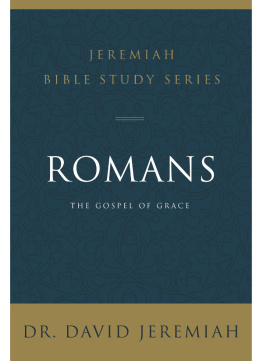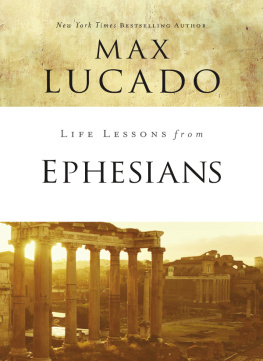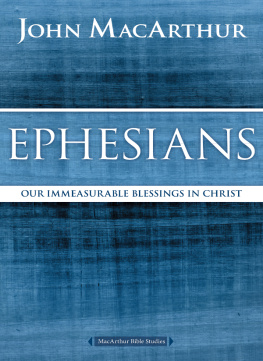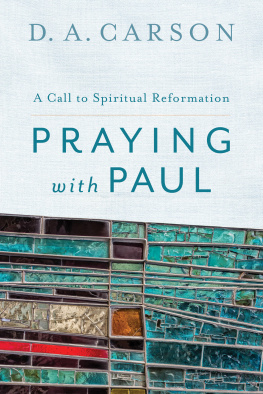In this ebook edition, please use your devices note-taking function to record your thoughts wherever you see the bracketed instructions [Your Notes] or [Your Response Here]. Use your devices highlighting function to record your response whenever you are asked to checkmark, circle, underline, or otherwise indicate your answer(s).
INTRODUCTION TO
The Letter to the Ephesians
And you He made alive, who were dead in trespasses and sins, in which you once walked according to the course of this world, according to the prince of the power of the air (Ephesians 2:12). Paul wrote these words to believers in Asia Minor, the site of a battle royal taking place between Christianity and Greek and Roman religions. The city of Ephesus, for its part, was home to a temple dedicated to Artemis, a fertility goddess, and her worship involved prostitution and other illicit sexual activity. Other cities in the region had similar temples devoted to one god or anotherand believers were feeling the tension between their new faith in Christ and the practices of the culture that surrounded them. So Paul penned this letter to remind them that Jesus was superior to everything the pagan religions had to offer. In fact, they had been spiritually dead in their former lives, living under the power of the enemy and sin, but Jesus had set them free and actually returned them to life. Pauls words still resonate with believers today, for we also need to know that following Jesus has a point and a purposeand that life in Christ is far superior to any other way of life the world has to offer.
A UTHOR AND D ATE
The writer of the letter identifies himself as Paul, an apostle of Jesus Christ (1:1) and Paul, the prisoner of Christ Jesus (3:1), and the content, themes, and vocabulary in the epistle share similarities with his other letters. Ignatius of Antioch (c. AD 35108), an early church father, quotes from the letter in his own writings and indicates that he assumed the author was Paul. The author of Ephesians also claims that he was a prisoner (see 3:1), and this fact aligns with Lukes account in the final chapter of Acts, where he tells of Pauls house arrest in the city of Rome. Given that Ephesians shares many similarities in content to the epistle of Colossians, scholars believe that the two letters were penned at about the same time. This would likely place the date of composition at AD 60, during the time of Pauls arrest in Rome.
B ACKGROUND AND S ETTING
Pauls letter to the Ephesians was likely circulated to a group of believers in the region of Asia Minor, rather than to the church located in the city. Scholars believe this is true due to the fact that (1) the word Ephesus does not appear in the oldest Greek manuscripts, (2) the author reports hearing information about the believers secondhand, and (3) the overall tone of the letter is impersonal in nature. All of these factors would prove to be inconsistent if Paul were directing the letter at a beloved community of believers in a city where he ministered for nearly three years. Unlike most of Pauls other letters, the specific situation that prompted his writing this letter is also unknown. There appears to be no crisis that Paul was addressing and no specific arguments from opponents that he was countering. Most likely, the purpose behind the letter (as with the epistle of Colossians) was to encourage the believers to be united in love and fully understand the blessings of the gift of salvation they had received. As previously noted, Paul was likely in prison in Rome when he wrote the letter, and he was seeking to ground, shape, and challenge his readers long-distance so they would grow in their faith.
K EY T HEMES
Several key themes are prominent in the letter to the Ephesians. The first is that salvation comes through faith alone and is a gift of grace from God. Paul wanted the believers to understand the incredible riches that they had been given in Christ. They had once been dead in their sins but had now received eternal life. This life in Jesus was far superior to anything the world had to offer (see 1:123). Paul also wanted the believers to recognize they were saved not because of anything they had done but because of everything God had done (see 2:13:21). Understanding that salvation is a gift, unearned, and freely given, encourages a humble spirit.
A second theme is that believers in Christ need to be united (see 4:16, 1731). This was an especially important message for the congregations in the region of Asia Minor, which were comprised of both Jewish and Gentile converts. These two groups had historically been opposed to one another, with Jews considering the Gentiles to be unclean and the Gentiles considering the Jewish practices to be strange and unusual. In order to establish unity, the believers needed to get past these ingrained animosities toward one another.
A third theme is that believers must exercise their spiritual gifts (see 4:716). Paul explains that all believers are given unique spiritual abilities by God. Some people are equipped to be teachers. Others are equipped to be administrators or evangelists. Pauls discussion of these spiritual gifts dovetails with his theme of unity. The apostle makes it clear that the believers spiritual gifts were intended to be put to use for the benefit of the entire body of Christ.
A fourth theme is that believers must walk in love, light, and wisdom (see 4:176:9). Paul called the Christians in Asia Minor to live in light of all the blessings they had received and conduct themselves in a way that was worthy of their high callings. They were to put off old behaviors that were incompatible with their new life in Christ and serve one another in the body of Christ. They were to imitate Gods attribute of love within their communities.
A final theme is that believers must engage in spiritual warfare (see 6:1024). The Christians in Asia Minor were no strangers to Satans strategies. The pagan activity in Ephesus and the other Roman cities exerted a strong pull on them. Those who resisted were regarded as outcasts and often persecuted for choosing to follow the way of Christ. Paul recognized these attacks against believers as coming directly from the enemyThe prince of the power of the air, the spirit who now works in the sons of disobedience (2:2). He encouraged them to recognize they were in a spiritual battle and needed to utilize the armor of God to defend themselves.

